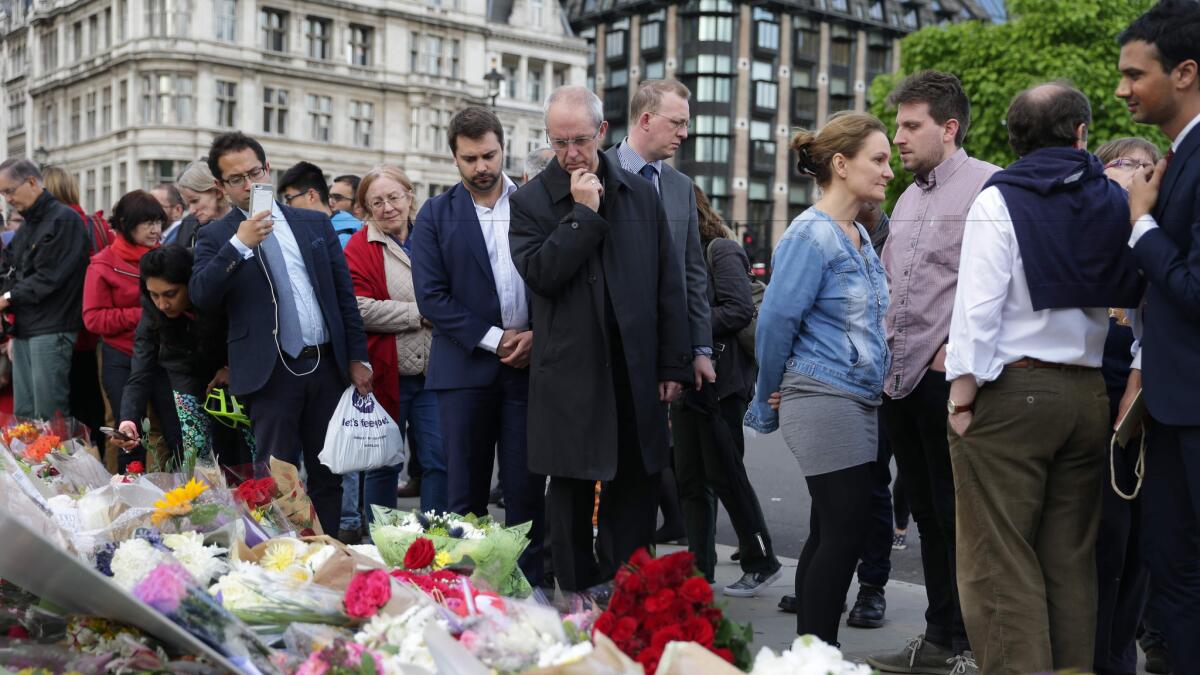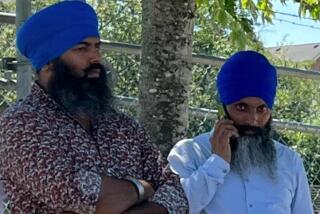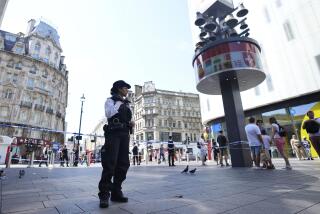British authorities look at possible links to right-wing extremism for suspect in lawmaker’s slaying

British politics came to a standstill on Friday as friends and colleagues paid tribute to slain lawmaker Jo Cox and details started to emerge about her assailant’s mental health issues and ties to right-wing extremism.
Police said they were treating her death as “an isolated, but targeted attack,” although authorities could not yet give a clear motive. In a rare show of unity, Prime Minister David Cameron and opposition Labor leader Jeremy Corbyn appeared side by side and laid flowers at a makeshift memorial close to where the 41-year-old was brutally shot and stabbed in her home district.
Cameron called for tolerance and praised Cox as someone who had dedicated her life to the service of others, first as an aid worker, then as a politician.
“Where we see hatred, where we find division, where we see intolerance we must drive it out of our politics and out of our public life, and out of our communities,” Cameron said.
Corbyn described her death as “an act of hatred” and “an attack on democracy.”
Police charged Thomas Mair, 52, with the fatal shooting late Friday and said the Birstall resident will appear in court Saturday in London.
“We have now charged a man with murder, grievous bodily harm, possession of a firearm with intent to commit an indictable offensive weapons and possession of an offensive weapon,” said Nick Wallen, a detective superintendent with the West Yorkshire Police.
Neighbors described Mair as a loner who talked about gardening or the weather. Outside his mother’s house, a family friend spoke to the press expressing their deep remorse.
“We are so sorry,” Rosemary Surman said. “It’s never going to go away and we’ll have to live with this each day of our lives. And we’re really sorry. He just looked like a normal person.”
One of Mair’s brothers said he too was struggling to come to terms with events. “My brother is not violent and is not at all that political,” Scott Mair, 49, told reporters. “I don’t even know who he votes for. He has a history of mental illness, but he has had help.”
Cox was attacked as she stepped from a car outside a public library ahead of a meeting with constituents. A 77-year-old man was seriously injured as he tried to intervene, but now is in stable condition.
See the most-read stories this hour »
In 2010, the Huddersfield Daily Examiner quoted Mair saying he had been volunteering at a day center for adults with mental health issues. “I can honestly say it has done me more good than all the psychotherapy and medication in the world,” he told the newspaper.
West Yorkshire police said his links to mental health services were a “clear line of inquiry,” but there appeared to be another side to his personality also. Acting Temporary Chief Constable Dee Collins said the suspect’s association with right-wing extremism was also “a priority line of enquiry which will help us establish the motive for the attack.”
One witness said Cox’s attacker shouted “Britain First” or “put Britain First” as he fatally wounded her. A far-right extremist group, Britain First, was quick to deny he was a member of the organization, but the Alabama-based Southern Poverty Law Center, which monitors hate crimes, said Mair was a supporter of the neo-Nazi National Alliance.
The law center published receipts which, the group says, show Mair bought a manual on how to adapt and make a handgun in 1999. He had also reportedly subscribed to a South African patriot magazine in the past.
It is as though there has been a terrible storm has passed over and everybody freezes and stops to look around to see the damage.
— Matthew Flinders, professor at the University of Sheffield
Vigils were taking place across Britain on Friday and widespread soul searching had begun about the political climate leading up to this killing. The past few weeks of campaigning on a referendum on whether the country should leave the European Union have been frenzied, with rhetoric becoming increasingly vitriolic and both sides openly accusing the other of lies.
A letter signed by dozens of leading political scientists this week warned that the two camps were espousing so much misinformation that voters were being denied the ability to make an informed decision. Immigration and sovereignty have become the most inflammatory issues with Remain campaigners accusing the Leave camp of stoking racist and xenophobic sentiments with claims that Britain needs to “take back control of our borders.”
Eurosceptic UKIP leader Nigel Farage also came in for fierce criticism for unveiling a poster that showing hundreds of predominantly non-white people walking along a road beside the words: “BREAKING POINT. The EU has failed us all.” The image bears a strong resemblance to a Nazi propaganda poster.
Cox had been campaigning for Britain to remain in the European Union and had also spoken passionately about the rights of refugees and the Syrian people.
“It was almost like a pressure cooker,” said Professor Matthew Flinders, from the University of Sheffield. “One of the clear impacts of the terrible events is that the temporary suspension of campaigning has give the whole of the UK the chance to step back and breath. It is as though there has been a terrible storm has passed over and everybody freezes and stops to look around to see the damage.”
EU referendum campaigning is due to resume again in coming days ahead of Thursday’s vote, one of the most important for a generation.
“I don’t think it will change people’s minds about how they vote, I think it might change the tone,” said Stephen Hix, a professor of political science at The London School of Economics.
But even beyond June 23, there were likely to be lasting reverberations from the slaying of a young, passionate politician with a bright career ahead of her. “We need to step back and say: do we really want our politics to become so vitriolic?” Hix asked.
Boyle is a special correspondent.
ALSO
UK probes neo-Nazi ties, mental health in Jo Cox slaying
Op-Ed: Dear Brits: Don’t listen to the U.S. on ‘Brexit’
Court convicts Auschwitz guard, 94, as accessory to murder
More to Read
Sign up for Essential California
The most important California stories and recommendations in your inbox every morning.
You may occasionally receive promotional content from the Los Angeles Times.










